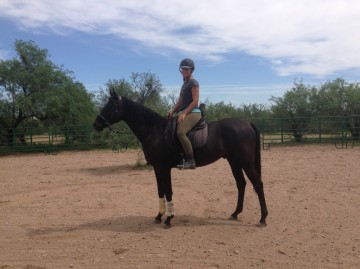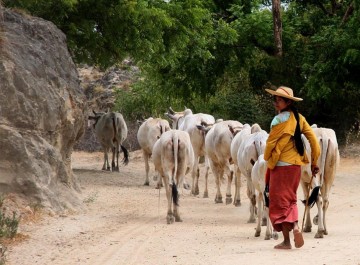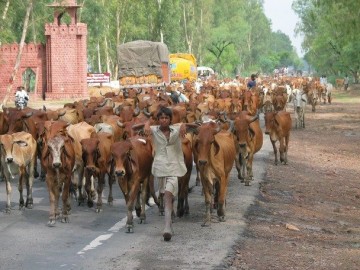
Join the Eponaquest Worldwide Herd Online!
Eponaquest Worldwide has joined social media. Follow us on Facebook and Twitter to stay up to date on the latest news, see pictures of the Eponaquest herd, read about new insights from Linda Kohanov and much more.
To join our Faceboook page, look for Eponaquest Worldwide or click here: www.facebook.com/EponaquestWorldwide and “like” the page.
To follow us on Twitter, look for #Eponaquest or use this link: https://twitter.com/Eponaquest
“Thanks to Eponaquest Instructor Heather Taylor, I’ve finally made the move into social media,” says founder Linda Kohanov. “Heather is managing the Facebook and Twitter pages, and has trained me in how to post photos and updates as well. People have commented on how nice it is to finally see photos of the horses they’ve read about it books, and during my travels through Europe over the next month, I’ll be able to share pictures of the people and horses I meet. I feel like I’m one of the last people to figure out how to engage with these popular communication sources, but after only a few weeks of experimentation, I’m very excited about these venues for sharing my adventures quickly and vividly!”
The Tour Continues
In addition to wrangling photos and stories for social media, it’s been a whirlwind summer for Linda. Travels to Maryland, Montana, Oregon, and Ohio have been interspersed with several new projects, including most notably a contract for her fifth book, which she will start writing on long plane and train rides during four weeks of travel through Europe from August 18 through September 14. (More on the new book below; for information on European events, including Linda’s German workshop, which still has three openings, see http://eponaquest.com/workshop-details/?event=895). Linda’s books have been published in Dutch, French, German, and most recently the Czech language. This will be her first trip to Europe to meet with readers, and to connect with a growing community of Eponaquest Instructors who live and practice across the Atlantic.
Once she returns, it will be time to write in earnest. As a result, Linda’s workshop schedule will be severely limited over the next year. Only three workshops will be open to the public this fall, one of which is already full. The two remaining workshops, The Power of the Herd and The Power Behind Nonviolence have proven to be among her most popular. “Much of the material to be featured in my new book was developed in these two workshops,” Linda reveals. “As a result, those who attend these fall events will get the latest innovations straight from the horse’s mouth, so to speak, with experiential activities developed especially for learning these new skills.”
A New Book on the Horizon
“After I finished The Power of the Herd I definitely needed a serious vacation from writing,” Linda says, “but rest, reflection and free time with my horses actually stirred up all kinds of insights that affected my workshops and lectures almost immediately. It was as if all the research I did for The Power of the Herd became the fuel for a bonfire of new perceptions on group behavior, not only in horses, but in humans as well. This led to the creation of what I began to call The Four Roles of a Master Herder, a program that quickly helps people to understand the previously unconscious dynamics of social interactions, as well as the hidden potential of a much more balanced form of leadership that helps free, equal people troubleshoot, collaborate and excel in times of rapid change.”
Over the last year, Linda has presented The Four Roles of the Master Herder in a wide variety of settings with great success: From equine-facilitated learning/therapy conferences in Cleveland and Missoula, to one-day indoor trainings at Nike headquarters in Portland, Oregon and The Bensman Group of financial advisors in Chicago, to a two day equine-facilitated workshop for Chubb Insurance executives at her ranch in Arizona, to 90-minute presentations for a variety of groups, including a conference for assisted living executives in Phoenix and a monthly meeting for the Women’s Network for a Sustainable Future.
“The response to this model has been so positive that I couldn’t help but hunker down and write a book about it,” Linda says. Tentatively titled The Four Roles of a Master Herder: Ancient Wisdom for Modern Leaders, the book is scheduled for publication in spring 2016.
“Basically,” Linda explains, “the Master Herder material grew out of research into traditional pastoral cultures that I overviewed in Chapters 7 and 8 of The Power of the Herd, and have since developed into practical skills for human situations in lectures and workshops after POH was released in 2013.


“In the images featured here, you can easily see one of the basic concepts at work. The woman is driving the animals from behind, taking the role of herd dominant. The man is taking on the role of leader. In the new book, I will show how understanding the difference between the roles of dominant, leader, and nurturer/companion is essential, as is separating these three roles from a very judicious use of predatory power for protection and for keeping the herd in balance with available resources. But one of the most interesting pieces to arise in developing this model involves how certain ‘shadow sides’ or unproductive behavior arise in humans when they overemphasize one or two of these roles. Nurturer/companions, for instance, can engage in extremely toxic forms of behavior when they don’t know how to use the skills of the dominant or leader to influence others and get their needs met. Naturally dominant people who don’t balance their innate power with the skills associated with leader and nurturer/companion can be incredibly destructive. And leaders who rely exclusively on their natural visionary skills can be incredibly ineffective in organizations if they don’t develop the other two roles as well. Additionally, it is incredibly enlightening to understand how to use these three roles in their nonpredatory forms, while saving humanity’s predatory side for very specific group-enhancing purposes, instead of the selfish, highly destructive ways that predatory power currently manifests in our culture.”
For this book, Linda is developing a self-assessment test to help people understand which roles they tend to favor, and which roles they currently ignore or even reject. To create the test, she is collaborating with two experts in relevant fields: Juli Lynch, PhD is an author, Advanced Eponaquest Instructor and an expert in organization development. Rebecca Bailey, PhD, is an author and therapist who specializes in working with families in crisis, including high conflict divorce and family reunification after abduction.
“I quickly realized that I needed two different kinds of experts to help create a two-part test, one for how people are currently functioning in business and other professional settings, and one for how people are functioning in their personal/family lives,” Linda says.
In collaborating with Dr. Bailey last year to create their innovative, now trademarked, therapeutic model, Connection Focused Therapy, Linda quickly realized that the Four Roles of a Master Herder were not just relevant to corporate settings, it also helped people understand unproductive family dynamics and learn new skills for how to better get their needs met at home. “Linda has pioneered an innovative approach to understanding human behaviors in groups,” Dr. Bailey explains. “By understanding the unconscious, often purely instinctual power plays in human relationships and nature, she is helping people shift old power patterns to be more effective in all their relationships. Corporations, educators, families and individuals all benefit from looking at themselves from this life altering perspective.”
Summer Workshop Reviews
A working version of the self-assessment test will be a part of Linda’s fall workshops. Even without this new tool, however, people have been very enthusiastic about the life-changing perspective the Four Roles offers.
During a June trip to Maryland, Linda met up with Meg Daley Olmert, author of Made for Each Other: The Biology of the Human Animal Bond, who has recently distinguished herself as Director of Research for the Warrior Canine Connection, Inc. (which pairs dogs with veterans dealing with PTSD). As an expert in the human-animal bond, Meg and her theories were featured in Linda’s most recent book The Power of the Herd. The two have been corresponding ever since, but they finally met in person when Meg made a special effort to attend one of Linda’s lectures in Maryland. Meg had this to say about the next round of insights Linda is exploring:
“Linda is one of those rare and important people with a keen eye, an open heart, and a way with words (as well as horses) that allows her to spot patterns and read subtexts of behavior that sail right past most of us. Once again, I was struck, by her power to articulate nonverbal truth—a very hard thing to do. And yet, she deftly gives us the ‘aha!’ and the ‘duh?’ and we come away better for it.
“In the Tao of Equus, she illuminated the personal journey horses can take us on. In The Power of the Herd, and in the research she has done for her new book, Linda celebrates the collective wisdom of the herd. Step-by-step, she shows us how the dynamic of equine herd power can work for us as well. It’s critical to remember that horses almost became extinct–not because of their social structure failed them–but because of drastic climate change. It was their social largess that allowed them to form life-saving bonds with their most deadly predator–us.
“Once upon a time, horses had to learn to trust us. Linda Kohanov is here to tell us that it’s time we learn to trust them. Once again, Linda is redefining ‘horsepower’ and showing us how it just might save our hides this time around.”
While Meg and others gained valuable new insights from an indoor lecture on this material, the effect of the Master Herder model is increased immeasurably when people get to practice the skills in a multi-day, equine-facilitated workshop. Ilene Kessler, LCSW, is a psychotherapist and founder of Holistic Healing with Horses, Long Island, New York. She attended the four-day Power of the Herd workshop in Maryland at Terry Lewis’ farm, and had this to say about the experience:
“Linda doesn’t just write about the power of the herd, she leads by example and creates it. She speaks of the crescendo [as a way to engage the role of dominance appropriately], but truly, she orchestrates a symphony of powerful experiences and intense emotions with safety, compassion and authentic connection. She has the ability to establish sacred space for self-exploration and discovery and still help participants to be in relationship with others, the herd and the environment.
“And how does she attract the most wonderful participants? In my thirty years of practice as a psychotherapist, I never met such a wonderful and diverse group of people; it was almost magical the way we clicked, creating this palpable energy pulsating through every session. Imagine spreading such a life force across the universe! That’s the human potential of the ‘power of the herd!’”
Sarah Severn, the Nike executive who brought Linda to Portland for a one-day indoor workshop with her Systems Innovation team is excited to add the equine-facilitated element in future executive workshops.
“Linda is a masterful storyteller and coach,” Sarah reports. “Our team had the benefit of working with her for a day and we came away energized and eager to put many of her principles into practice. I would definitely recommend Linda’s work both for personal mastery and team building. The next step for us has to be practical work with Linda’s equine assistants to really embody the approach.”
Eponaquest Apprenticeship
The indoor training materials, outdoor equine-facilitated activities, and phone-coaching techniques associated with the Twelve Power of the Herd Guiding Principles and the Four Roles of the Master Herder truly set Eponaquest’s Equine-Facilitated Learning Apprenticeship apart from any other EFL facilitator-training modality out there.
“This model for personal as well as professional development is so rich and multi-faceted that we simply cannot teach it in less than four weeks, though these week-long trainings are spread out over a six month period,” Linda says. “When you graduate, however, you will have practiced the tools to run an innovative equine-facilitated learning program for individuals and groups, families and corporate leadership teams. You’ll also have the tools, handouts, and power point presentations to teach the Four Roles of the Master Herder in large, indoor settings, as well as be able to do phone coaching sessions in the 12 Guiding Principles. We’ve even developed simple experiential activities to use in lecture-based settings where people are not yet convinced that horse-facilitated work is the way to go. This is a great way to reach out to people who are not innately interested in horses. We can’t spread this work by preaching only to the converted. For the last five years, I’ve searched for better and better ways to take horse wisdom indoors. In this way, people who aren’t yet ready to invest in equine-facilitated work find that the nonpredatory wisdom and power of the horse immediately enhances their lives!”
Sylvain Gillier-Imbs, who graduated from the Eponaquest apprenticeship last spring, has already found the indoor workshop materials to be a helpful way to expand awareness of the equine-facilitated work.
“In May 2014,” he reports, “during a one-day indoor workshop in Paris, I had the opportunity, with my fellow Eponaquest POH Instructor Claire Labaeye, to present several tools I learned during my training with Linda Kohanov and the members of the Eponaquest faculty in Amado, AZ.
“This workshop was held at CARE France, an international NGO, in front of around 15 executives of the organization. Claire and I presented the body scan method, the Four Roles of a Master Herder, and other skills described in Linda Kohanov’s book The Power of the Herd, and we practiced with non-verbal experiential exercises.
“The feedback we received was that the presentation of the ‘Four Roles’ or styles of leadership gave immediate understanding of many aspects of the current group dynamics among the executive managers of the organization, and was easy to practice in an everyday environment. Our presentation of the dominant, leader, and companion styles of leadership was easy to follow and described with accuracy the behavior of some of the participants. It made them understand what their strengths were. We were told that some aspects of the body scan method could lead to powerful insights, and intuitions. As some of these insights were kept private, others were adequate to be used within undergoing humanitarian projects in Africa or in other countries where the NGO has current projects ongoing.”
Congratulations Sylvain and Claire!
There are still a couple of openings for the apprenticeship class starting in October, and some people have already reserved openings in the 2015 apprenticeship. For more information on this in-depth facilitator training, contact Sue Smades at info@eponaquest.com or 520-455-5908.
NOTE: While Linda is pleased that this work is spreading to many contexts, we have also received reports that some non-Eponaquest equine-facilitated learning/therapy practices have incorporated some of Linda’s new ideas from attending her most recent workshops or reading The Power of the Herd. As a result, it’s important to state that ONLY those Eponaquest practitioners listed on the “Recommended Instructors” page of the Eponaquest Worldwide website—with the designation “POH” beside their names—have had in-depth training in how to teach these new skills. These are the only people personally trained by Linda Kohanov to teach this new material. “I hope that everyone who reads the book or attends one of our workshops begins using these skills in every day life, and that may include teaching what you’ve learned to friends, family and colleagues,” Linda says. “But it’s also important for prospective clients to know who has really invested the time and resources to study how to teach these skills in depth. As a result, I can only endorse those programs that employ an Eponaquest Instructor with the POH designation, someone who I have trained directly.”
A New Documentary
A terrific opportunity to participate in a workshop and documentary film project about the healing power of horses has come to our attention. Filming will occur on September 29th at the end of the workshop, Being in the Eye of Change, http://eponaquest.com/workshop-details/?event=962, which is being offered at Eponaquest in Amado, AZ by Eponaquest/POH Instructors Susan Crimmins, Ph.D., LCSW, SEP and Lucinda Vette, J.D., Assistant Ranch Manager. This workshop integrates horse wisdom within the theme of organic intelligence®, as we discover how to connect to our own inner guidance during times of transition.
The producers, entertainment industry artists Charley Lang and Dan Genetti, have worked decades in creating documentaries that inspire and influence societal trends. Their HBO award-winning film Gay Cops: Pride Behind the Badge, screened at festivals worldwide, on television in the United States, and is used in diversity training programs at police academies throughout the country.
Among Dan Genetti’s producing credits are the films Mandela, Lucky, Sunshine Cleaning and Basketball Diaries. Charley Lang, an accomplished Broadway and television actor, director and producer, is also a professor of psychology and psychotherapist in private practice. Their proposed project documenting the healing power of horses with humans, will explore this intriguing interactive process to deliver a film that is insightful and entertaining, inspiring the public’s awareness of the value and sanctity of these sentient beings.
Congratulations to Susan Crimmins for gaining the attention and support of these talented film-makers!